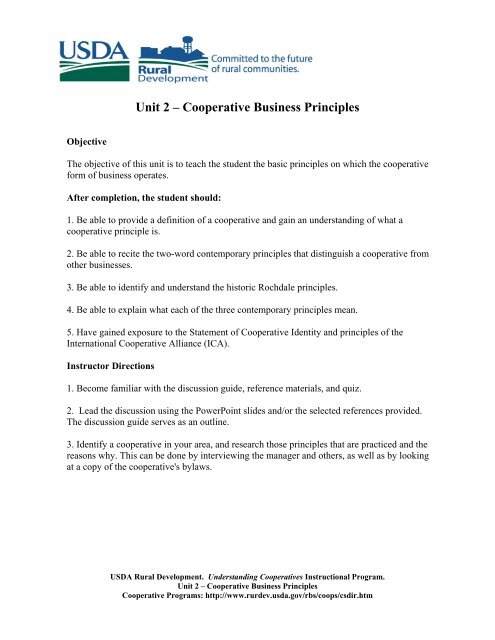Unit 2 – Cooperative Business Principles
Unit 2 â Cooperative Business Principles - Cooperative Network
Unit 2 â Cooperative Business Principles - Cooperative Network
- No tags were found...
Create successful ePaper yourself
Turn your PDF publications into a flip-book with our unique Google optimized e-Paper software.
<strong>Unit</strong> 2 <strong>–</strong> <strong>Cooperative</strong> <strong>Business</strong> <strong>Principles</strong><br />
Objective<br />
The objective of this unit is to teach the student the basic principles on which the cooperative<br />
form of business operates.<br />
After completion, the student should:<br />
1. Be able to provide a definition of a cooperative and gain an understanding of what a<br />
cooperative principle is.<br />
2. Be able to recite the two-word contemporary principles that distinguish a cooperative from<br />
other businesses.<br />
3. Be able to identify and understand the historic Rochdale principles.<br />
4. Be able to explain what each of the three contemporary principles mean.<br />
5. Have gained exposure to the Statement of <strong>Cooperative</strong> Identity and principles of the<br />
International <strong>Cooperative</strong> Alliance (ICA).<br />
Instructor Directions<br />
1. Become familiar with the discussion guide, reference materials, and quiz.<br />
2. Lead the discussion using the PowerPoint slides and/or the selected references provided.<br />
The discussion guide serves as an outline.<br />
3. Identify a cooperative in your area, and research those principles that are practiced and the<br />
reasons why. This can be done by interviewing the manager and others, as well as by looking<br />
at a copy of the cooperative's bylaws.<br />
USDA Rural Development. Understanding <strong>Cooperative</strong>s Instructional Program.<br />
<strong>Unit</strong> 2 <strong>–</strong> <strong>Cooperative</strong> <strong>Business</strong> <strong>Principles</strong><br />
<strong>Cooperative</strong> Programs: http://www.rurdev.usda.gov/rbs/coops/csdir.htm
<strong>Unit</strong> 2 <strong>–</strong> Index and References<br />
Teaching Tools<br />
Instructor Discussion Guide<br />
Handout 2 - International <strong>Cooperative</strong> Alliance (ICA): Statement on the <strong>Cooperative</strong> Identity<br />
Quiz 2<br />
Quiz 2 Answers<br />
<strong>Unit</strong> 2 PowerPoint Slides<br />
S 2.1 <strong>Cooperative</strong> Definition Reviewed<br />
S 2.2 Definition of a Principle<br />
S 2.3 - S 2.5 Contemporary <strong>Cooperative</strong> <strong>Principles</strong><br />
S 2.6 - S 2.7 Rochdale <strong>Principles</strong><br />
S 2.8 - S 2.9 Traditional <strong>Cooperative</strong> <strong>Principles</strong><br />
S 2.10 Quote (Abraham Lincoln)<br />
S 2.11 Contemporary <strong>Principles</strong> Explained<br />
S 2.12 International <strong>Cooperative</strong> Alliance<br />
.<br />
Teacher References<br />
CIR 55: Co-ops 101<br />
CIR 5: <strong>Cooperative</strong>s in Agribusiness<br />
CIR 11: <strong>Cooperative</strong>s: What They Are and the Roles of Directors, Members, Management, and<br />
Employees (chapter 1)<br />
CIR 11 Chapter 1 PowerPoint<br />
CIR 45, Section 2: <strong>Cooperative</strong> <strong>Business</strong> <strong>Principles</strong><br />
International <strong>Cooperative</strong> Alliance Website: http://www.coop.org/ica/info/enprinciples.html<br />
Student References<br />
CIR 5: <strong>Cooperative</strong>s in Agribusiness<br />
CIR 11: <strong>Cooperative</strong>s: What They Are and the Roles of Directors, Members, Management, and<br />
Employees<br />
CIR 45, Section 2: <strong>Cooperative</strong> <strong>Business</strong> <strong>Principles</strong><br />
USDA Rural Development. Understanding <strong>Cooperative</strong>s Instructional Program.<br />
<strong>Unit</strong> 2 <strong>–</strong> <strong>Cooperative</strong> <strong>Business</strong> <strong>Principles</strong><br />
<strong>Cooperative</strong> Programs: http://www.rurdev.usda.gov/rbs/coops/csdir.htm
<strong>Unit</strong> 2 - Instructor Discussion Guide<br />
Corresponding slides are in parenthesis with associated discussion points, denoted "S" for slide<br />
and by number.<br />
I. Definition of a cooperative (S 2.1 & S 2.2)<br />
1. A cooperative is a business owned and controlled by persons who use its services. Benefits are<br />
derived and distributed equitably on the basis of use.<br />
It is mainly distinguished from other business forms by three contemporary principles (a<br />
principle is a basic idea defining special characteristics).<br />
2. <strong>Cooperative</strong> <strong>Principles</strong> (S 2.3, S 2.4, & S 2.5)<br />
a) The User-Owner Principle: The people who own and finance the cooperative are those that<br />
use the cooperative.<br />
b) The User-Control Principle: The people who control the cooperative are those that use the<br />
cooperative.<br />
c) The User-Benefit Principle: the cooperative's sole purpose is to provide and distribute<br />
benefits to its users on the basis of their use.<br />
3. These principles generally define how cooperatives operate. <strong>Cooperative</strong> principles have<br />
been in existence and working for people over a long period of time. Historically, the first set of<br />
operating principles where developed bye a group in England called the Rochdale pioneers.<br />
While dated, the Rochdale principles are still reflected in today’s modern cooperative principles.<br />
II. The Rochdale <strong>Principles</strong>. (S 2.6 & S 2.7)<br />
a) Current day principles evolved from "Rules of Conduct and Points of Organization," put forth<br />
by the Rochdale Equitable Pioneers Society, Rochdale, England; probably for the first time in its<br />
Annual Almanac of 1860.<br />
b) There were twelve features/principles of the original Rochdale cooperative:<br />
1) Voting is by members on democratic basis.<br />
2) Membership is open.<br />
3) Equity is provided by patrons.<br />
4) Equity ownership share of individual patrons is limited.<br />
5) Net income is distributed to patrons as refunds on a cost basis.<br />
6) Return on equity capital is limited.<br />
7) Exchange of goods and services at market prices.<br />
8) Duty to educate.<br />
9) Cash trading only.<br />
10) Assume no unusual risk.<br />
11) Political and religious neutrality.<br />
12) Equality of the sexes in membership.<br />
USDA Rural Development. Understanding <strong>Cooperative</strong>s Instructional Program.<br />
<strong>Unit</strong> 2 <strong>–</strong> <strong>Cooperative</strong> <strong>Business</strong> <strong>Principles</strong><br />
<strong>Cooperative</strong> Programs: http://www.rurdev.usda.gov/rbs/coops/csdir.htm
<strong>Unit</strong> 2 <strong>–</strong> Instructor Discussion Guide (continued)<br />
III. Review of Four Traditional <strong>Cooperative</strong> <strong>Principles</strong> (S 2.8 & S 2.9)<br />
Allows for a greater understanding of cooperative operations:<br />
a) Service at cost - surpluses returned to members<br />
b) Obligational responsibility and benefits received are in proportion to use<br />
c) Limited return on equity capital - value of services most important<br />
d) Democratic control - one member, one vote, or proportional voting systems<br />
IV. Three Contemporary <strong>Cooperative</strong> <strong>Principles</strong> Further Explained (S 2.10 & S 2.11)<br />
a) Abraham Lincoln said, "Important principles may and must be flexible."<br />
b) Contemporary principles are simple and avoid including specific points some may consider<br />
policies or practices. At the same time, they implicitly encompass an array of practices.<br />
c) Contemporary principles of user-control, user-owned, user-benefit<br />
1) User-control - voting is by members on a democratic or proportional basis.<br />
2) User-owned - equity is provided by patrons.<br />
3) User-benefit - net earnings are distributed to patrons as refunds on a cost basis.<br />
V. Introduction to the International <strong>Cooperative</strong> Alliance (S 2.12 & Handout 2)<br />
Have students take Quiz 2 and then discuss answers.<br />
USDA Rural Development. Understanding <strong>Cooperative</strong>s Instructional Program.<br />
<strong>Unit</strong> 2 <strong>–</strong> <strong>Cooperative</strong> <strong>Business</strong> <strong>Principles</strong><br />
<strong>Cooperative</strong> Programs: http://www.rurdev.usda.gov/rbs/coops/csdir.htm
Handout 2 <strong>–</strong> International <strong>Cooperative</strong> Alliance (ICA)<br />
STATEMENT ON THE COOPERATIVE IDENTITY<br />
Definition: A cooperative is an autonomous association of persons united voluntarily to meet their<br />
common economic, social, and cultural needs and aspirations through a jointly-owned and<br />
democratically-controlled enterprise.<br />
Values: <strong>Cooperative</strong>s are based on the values of self-help, self-responsibility, democracy, equality, equity<br />
and solidarity. In the tradition of their founders, cooperative members believe in the ethical values of<br />
honesty, openness, social responsibility and caring for others.<br />
<strong>Principles</strong>: The co-operative principles are guidelines by which co-operatives put their values into<br />
practice.<br />
1st Principle: Voluntary and Open Membership - <strong>Cooperative</strong>s are voluntary organizations, open to all<br />
persons able to use their services and willing to accept the responsibilities of membership, without<br />
gender, social, racial, political or religious discrimination.<br />
2nd Principle: Democratic Member Control <strong>–</strong> <strong>Cooperative</strong>s are democratic organizations controlled by<br />
their members, who actively participate in setting their policies and making decisions. Men and women<br />
serving as elected representatives are accountable to the membership. In primary cooperatives members<br />
have equal voting rights (one member, one vote) and cooperatives at other levels are also organized in a<br />
democratic manner.<br />
3rd Principle: Member Economic Participation - Members contribute equitably to, and democratically<br />
control, the capital of their cooperative. At least part of that capital is usually the common property of the<br />
co-operative. Members usually receive limited compensation, if any, on capital subscribed as a condition<br />
of membership. Members allocate surpluses for any or all of the following purposes: developing their cooperative,<br />
possibly by setting up reserves, part of which at least would be indivisible; benefiting members<br />
in proportion to their transactions with the co-operative; and supporting other activities approved by the<br />
membership.<br />
4th Principle: Autonomy and Independence - <strong>Cooperative</strong>s are autonomous, self-help organizations<br />
controlled by their members. If they enter to agreements with other organizations, including governments,<br />
or raise capital from external sources, they do so on terms that ensure democratic control by their<br />
members and maintain their co-operative autonomy.<br />
5th Principle: Education, Training and Information - <strong>Cooperative</strong>s provide education and training for<br />
their members, elected representatives, managers, and employees so they can contribute effectively to the<br />
development of their co-operatives. They inform the general public - particularly young people and<br />
opinion leaders - about the nature and benefits of cooperation.<br />
6th Principle: Co-operation among Co-operatives - <strong>Cooperative</strong>s serve their members most effectively<br />
and strengthen the co-operative movement by working together through local, national, regional and<br />
international structures.<br />
7th Principle: Concern for Community - <strong>Cooperative</strong>s work for the sustainable development of their<br />
communities through policies approved by their members.<br />
International <strong>Cooperative</strong> Alliance Website: http://www.coop.org/ica/info/enprinciples.html<br />
USDA Rural Development. Understanding <strong>Cooperative</strong>s Instructional Program.<br />
<strong>Unit</strong> 2 <strong>–</strong> <strong>Cooperative</strong> <strong>Business</strong> <strong>Principles</strong><br />
<strong>Cooperative</strong> Programs: http://www.rurdev.usda.gov/rbs/coops/csdir.htm
Quiz 2<br />
1. Describe in your own words what the following principles mean.<br />
a) Service at cost:<br />
b) Financial obligation and benefits proportional to use:<br />
c) Limited return on equity capital:<br />
d) Democratic control:<br />
2. The three contemporary cooperative principles that distinguish a cooperative business from other<br />
business forms in the <strong>Unit</strong>ed States are (complete with one word answer)<br />
a) User-______<br />
b) User-______<br />
c) User-______<br />
3. From the list below, identify by number the original 12 features that are known as the "Rochdale<br />
<strong>Principles</strong>."<br />
a) Rochdale <strong>Principles</strong> (circle the correct 12):<br />
1) Voting by members on a<br />
democratic basis.<br />
2) Membership is closed.<br />
3) Return on equity capital is limited.<br />
4) Assume no unusual risk.<br />
5) Membership is open.<br />
6) Duty to educate.<br />
7) Equity is borrowed from a bank.<br />
8) Net earnings are distributed to<br />
patrons as refunds on a cost basis.<br />
9) Political/religious neutrality.<br />
10) Equity is provided by patrons.<br />
11) Women only as patrons.<br />
12) Cash trading only.<br />
13) Equity ownership share of<br />
individual patrons is limited.<br />
14) Equality of the sexes in membership.<br />
15) Exchange of goods and services at market<br />
prices.<br />
USDA Rural Development. Understanding <strong>Cooperative</strong>s Instructional Program.<br />
<strong>Unit</strong> 2 <strong>–</strong> <strong>Cooperative</strong> <strong>Business</strong> <strong>Principles</strong><br />
<strong>Cooperative</strong> Programs: http://www.rurdev.usda.gov/rbs/coops/csdir.htm
Quiz 2 (continued)<br />
b) The Rochdale pioneers were associated with what country? _______________________________<br />
4. How many principles are listed in the International <strong>Cooperative</strong> Alliance (ICA) statement of<br />
cooperative identity?<br />
a. _______<br />
b. Name one of the ICA principles that most significantly differs from the Rochdale, traditional, and<br />
contemporary cooperative principles that were discussed.<br />
USDA Rural Development. Understanding <strong>Cooperative</strong>s Instructional Program.<br />
<strong>Unit</strong> 2 <strong>–</strong> <strong>Cooperative</strong> <strong>Business</strong> <strong>Principles</strong><br />
<strong>Cooperative</strong> Programs: http://www.rurdev.usda.gov/rbs/coops/csdir.htm
Quiz 2 Answers<br />
1. Instructor should evaluate answers according to reference materials provided and manner in which<br />
concepts were taught.<br />
2. (Can be in any order)<br />
a) User-Owned<br />
b) User-Controlled<br />
c) User-Benefits<br />
3. a) 1, 3, 4, 5, 6, 8, 9, 10, 12, 13, 14, 15<br />
b) England<br />
4. a) 7<br />
b) Autonomy and independence; cooperation among cooperatives; or concern for community<br />
USDA Rural Development. Understanding <strong>Cooperative</strong>s Instructional Program.<br />
<strong>Unit</strong> 2 <strong>–</strong> <strong>Cooperative</strong> <strong>Business</strong> <strong>Principles</strong><br />
<strong>Cooperative</strong> Programs: http://www.rurdev.usda.gov/rbs/coops/csdir.htm




